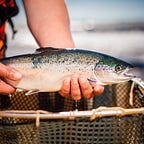Truth for Sale?
An interesting thing happened south of the equator last week. An author named Richard Flanagan put his house in Tasmania up for sale. The “remarkable property” that “promotes calm and peace” is settled along a “stunning coastline” where the lucky buyer “can literally dive into the water, fish, fetch fresh oysters, or just relish in the serenity and beauty.” That’s how Mr Flanagan describes the property that is hoping to fetch over eight times his purchase price.
So, now here’s the interesting part…
Mr Flanagan’s latest book, called “Toxic”, was dedicated to attacking fish farms near his home and described the same property.
Mr Flanagan’s book describes the fish farms near his home as creating a “heavy industrial site surrounded by factory ships” and a region where “abalone, crayfish, penguins, shellfish and seagrass disappeared” with the local waters covered in “bright green slime and “strange bubbly brown broth”, and are “now more dead than alive”.
That’s quite the contradictory story telling.
Just like a former American president, Mr Flanagan chooses his desired outcome and creates a story to support that outcome. However, whereas celebrity presidents seem to be able to use their social status to skirt each lie or hypocrisy before moving on to the next, anti-salmon farming activists are not above having to answer for their story telling.
It’s just rare that they are actually called on their bullshit. It is therefore refreshing to see Mr Flanagan — after receiving a flurry of promotional media attention for his book “Toxic” — to be called out on this clear hypocrisy by Tasmania’s Mercury News.
In British Columbia, the tactic of telling stories to support your desired outcome has been a staple play for seasoned campaigners. For example, if you want to convince your Facebook followers that a salmon farm is directly linked to a sea lice on wild salmon, just take a photo of yourself looking angry when holding up that one fish that you selected (amongst the hundreds collected in a seine net) that has a sea louse attached. On the flipside, when you want people to believe that the absence of a farm supports your story of “no farms, no lice”, then just select that one fish without sea lice, and record yourself looking very energised by your miraculous discovery. Of course, be certain never to show your work.
Hey, you can’t blame them — the tactic often works. Private Eye magazine in Great Britain recently repeated the Canadian “no farms, no lice” story in their mag. No questions asked.
Perhaps a disclaimer for each activist story is warranted? The disclaimer footnoted to Mr Flanagan’s realty page is, quite ironically, spot on: “All information contained herein is gathered from sources we believe to be reliable. However we cannot guarantee its accuracy and interested persons should rely on their own enquiries.”
Good advice realty page footnote. Good advice.
Authored by Ian Roberts.
Ian has been a salmon farmer for 30 years, working in Scotland, Canada and Norway.
